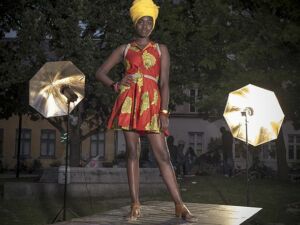News
Free bus routes and visibly African roots at Copenhagen Fashion Week
This article is more than 10 years old.
Showcasing new trends for Spring and Summer 2016, Copenhagen Fashion Week will present the best of Danish fashion design and more

The pop-up series ‘Clothes make the man – Africa in Denmark’ will be appearing all over the city (photo: Morten Vest)
Copenhagen Fashion Week kicks off next Wednesday with a line-up that includes well-known Danish labels such as Ganni, Malene Birger and Ivan Grundahl as well as talented new designers.
Stay up to date with an app
The three-day summer edition of CFW will include more than 200 fashion events, including four trade fairs.
Those interested can stay updated on the news, get notified about the program and watch runway videos in real time with the new CFW app, which is available for download on iTunes.
How will Vibskov shock us this time?
One of the most keenly anticipated runway shows is Henrik Vibskov’s Spring and Summer 2016 range ot the main CFW stage at City Hall on Wednesday at 21:00.
A glance at the names of some of his previous runway shows – ‘The Transparent Tongue’, ‘The Stiff Neck Chamber’, and ‘The Spaghetti Handjob’ – confirms Vibskov is a provocative designer who enjoys putting on imaginative and theatrical shows.
Free shuttle service
A free shuttle service operating between CIFF and Revolver will be provided to visitors to make transport between the trade fairs easier.
The bus service will run every 30 minutes from 10:00 to 18:00 on Wednesday and Thursday and from 10:00 to 16:00 on Friday.
Focus on African minorities in Denmark
This year’s CFW also includes a series of pop-up happenings and performances called ‘Clothes make the man – Africa in Denmark’.
Providing a humourous alternative to the main fashion shows and spiced with a political statement, the stage designer Helle Fuglsang will focus on how clothes create our identity and how we experience minorities in our society.
Just recently, Danish magazine ALT for Damerne featured a dark-skinned woman on its cover for the first time in over 20 years.
“As a starting point, I use classic industry set-ups such as the catwalk or a cover-girl photo session to highlight and focus on people with African roots living in Denmark,” explained Fuglsang.
“This is particularly important at a time when the fear of the unknown is becoming more and more prevalent.”
The performances will take place from 5-7 August at different locations across Copenhagen, including Strøget, Gammel Torv, Rådhuspladsen and Blågårds Plads .










































